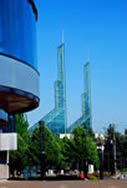
Did You Attend the 97th Annual Meeting in Portland? Please take the survey.
 Portland, as the site for the 2012 Ecological Society of America annual meeting, is an
ideal match for this theme. At the broader scale, Oregon has a diversity of ecosystems
(rocky coastal habitat, temperate rainforest, mid to high elevation conifer forest, and
even desert in the southeastern portion of the state). Oregon is largely forested, and
timber harvesting has traditionally been the major economic driver of the state. More
recently, the economy has shifted towards high tech development forcing changes in
land-use planning. As a city, Portland lies in the shadow of Mount Hood, one of the
largest mountains in the United States, and lies at the confluence of two of the great
rivers of the Pacific Northwest (Columbia and Willamette). The region has had a long
and rich history of natural resource utilization—sometimes sustainably, sometimes not.
Portland is now known as one of the most progressive and “greenest” cities in the
United States and is widely recognized for their land-use planning. Against a backdrop
of urban and cultural development they have in many ways become a model for
utilization, sustainability, and preservation of the ecosystems in which they live.
Portland, as the site for the 2012 Ecological Society of America annual meeting, is an
ideal match for this theme. At the broader scale, Oregon has a diversity of ecosystems
(rocky coastal habitat, temperate rainforest, mid to high elevation conifer forest, and
even desert in the southeastern portion of the state). Oregon is largely forested, and
timber harvesting has traditionally been the major economic driver of the state. More
recently, the economy has shifted towards high tech development forcing changes in
land-use planning. As a city, Portland lies in the shadow of Mount Hood, one of the
largest mountains in the United States, and lies at the confluence of two of the great
rivers of the Pacific Northwest (Columbia and Willamette). The region has had a long
and rich history of natural resource utilization—sometimes sustainably, sometimes not.
Portland is now known as one of the most progressive and “greenest” cities in the
United States and is widely recognized for their land-use planning. Against a backdrop
of urban and cultural development they have in many ways become a model for
utilization, sustainability, and preservation of the ecosystems in which they live.
Biodiversity, is generally thought of by most as the number and variety of organisms on
earth. Few include the other two aspects of the more comprehensive definition which
requires the inclusion and consideration of both genetics and ecosystems. All three
aspects are essential for the broadest consideration of life on earth. Species population
declines and mass extinctions have always been part of the natural process; however,
observations made over the last few decades have made it clear that these dynamics
are quite out of the ordinary. Moreover, it now appears that one species, Homo sapiens,
is at the center of these changes and massive alteration to natural ecosystems is being
felt around the world. Thus, at no other time in human history has it become more
important than the present to better understand and sustain the ecosystems in which we
live. To preserve biological diversity (ecosystems, species, and genes) we need to focus
on informed, sustainable utilization at the landscape scale.

Please Note: All Deadlines Are 5:00 PM Eastern
ABSTRACT DEADLINES
| Call Open: | Deadline for Submission: | Acceptance Notification by: | Notification of session date and location by: | |
|---|---|---|---|---|
Contributed Oral and Poster Abstracts |
mid Dec., 2011 |
Feb. 23, 2012 |
Apr. 19, 2012 |
May 17, 2012 |
Symposium, Organized Oral Session, and Organized Poster Abstracts |
mid Jan., 2011 |
Feb. 23, 2012 |
N/A |
Feb. 17, 2012 |
Latebreaking Poster Abstracts |
mid April, 2012 |
May 10, 2012 |
June 9, 2012 |
All Latebreaking posters will be presented on Friday, August 10, 2012. |
PROPOSAL DEADLINES
| Call Open: | Deadline for Submission: | Acceptance Notification by: | Notification of session date and location by: | |
|---|---|---|---|---|
Symposium, Organized Oral Session Proposals, and Organized Poster Sessions |
mid July, 2011 |
Sept. 15, 2011 |
Dec. 15, 2011 |
Feb. 16, 2012 |
Workshop, Field Trip, and Special Session Proposals |
late Sept., 2011 |
Dec. 1, 2011 |
Jan. 12, 2012 |
Feb. 16, 2012 |





 phone 202-833-8773
phone 202-833-8773